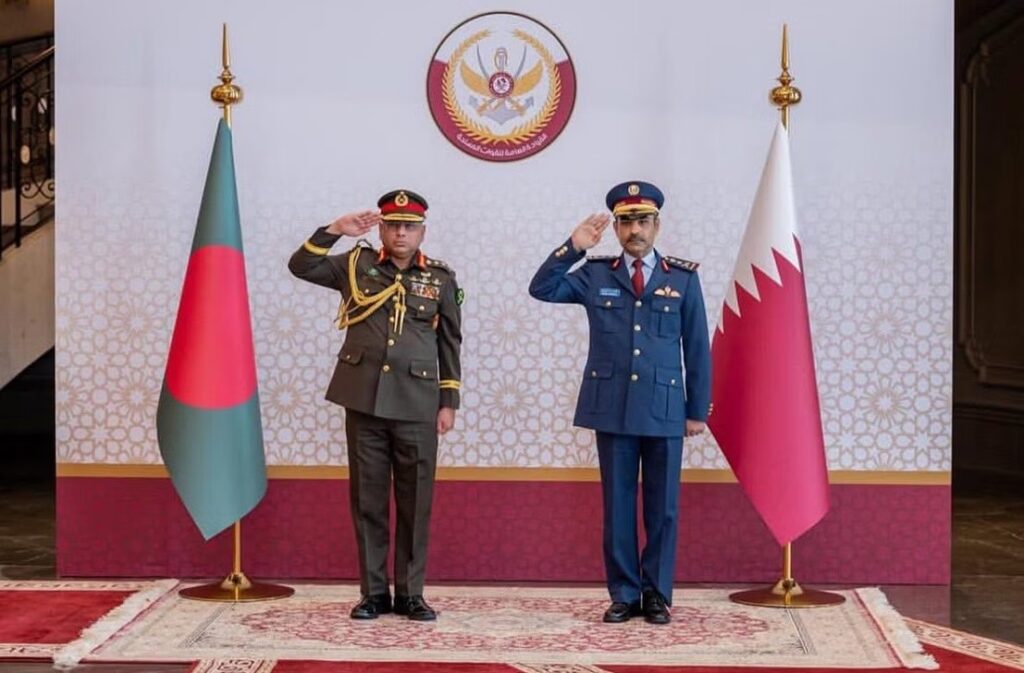Recent developments suggest an escalation in US military involvement along the Bangladesh-Myanmar border, potentially reshaping the security landscape across Southeast Asia. On May 8, a four-member team from the United States Air Force landed at Dhaka’s Shahjalal International Airport via Qatar Airways. The team, reportedly including logistics experts and management personnel linked to the Defense Intelligence Agency, appears to be preparing for the arrival of a “heavy cargo aircraft” in Bangladesh.
This US military presence follows closely behind Bangladesh Army Chief General Waker-uz-Zaman’s two-day visit to Qatar on May 3, home to Al Udeid Air Base and the USAF’s 379th Air Expeditionary Wing. The timing suggests possible coordination between US and Bangladeshi military officials. According to security sources, the USAF officers will remain in Dhaka until a cargo aircraft delivers containers reportedly containing weapons destined for the Bangladesh-Myanmar border, aligning with earlier allegations of US military aid to rebel groups in Myanmar.
The potential weapons transfer takes place against the backdrop of Myanmar’s complex civil conflict and raises particular concerns regarding Rohingya militant activities. The Arakan Rohingya Salvation Army (ARSA), designated a terrorist organization by Myanmar following coordinated attacks on security forces in 2016 and 2017, has established a troubling operational pattern. Intelligence reports have documented ARSA’s involvement in targeted killings of moderate Rohingya community leaders, forced recruitment from refugee camps, and systematic extortion of vulnerable populations. Security agencies have identified concerning links between certain Rohingya militant factions and transnational terrorist networks, including evidence of foreign fighters and ideological radicalisation.
The refugee camps housing over a million Rohingya in Bangladesh have become problematic security environments, with Bangladesh authorities periodically discovering weapons caches and training materials within these settlements. Introducing advanced weaponry into this volatile region risks not only exacerbating cross-border violence but potentially strengthening extremist elements operating beyond state control. Military analysts warn that arming such groups could create long-term security challenges similar to other historical instances where tactical support for non-state actors resulted in protracted regional instability.
The apparent US intervention could trigger responses from other regional powers protecting their strategic interests. India, particularly concerned about security along its eastern flank, might intensify its rumoured support for the Arakan Army, a powerful ethnic armed organisation operating in Myanmar’s Rankine State to maintain influence in the region and counter both Chinese expansion and US encroachment. This could further complicate an already fragmented conflict landscape where multiple armed groups vie for territorial control and political legitimacy.
While independent verification of these weapons transfer reports remains challenging, the activities represent a significant potential shift in US regional strategy. For Bangladesh, traditionally maintaining a non-aligned foreign policy, facilitating such operations would mark a notable departure from its established diplomatic positioning. As major powers pursue their strategic objectives across South and Southeast Asia, the weaponization of ethnic and religious conflicts threatens to prolong Myanmar’s civil strife and destabilize an already fragile region.

